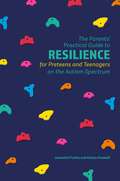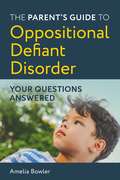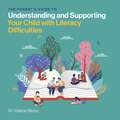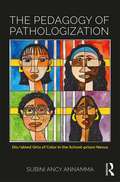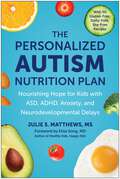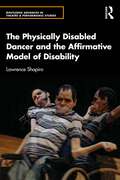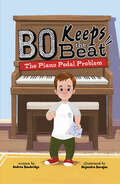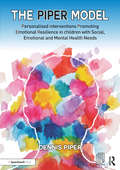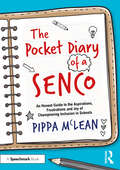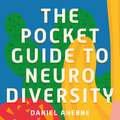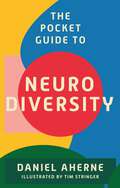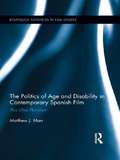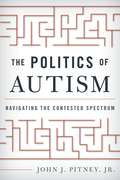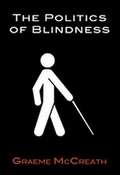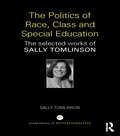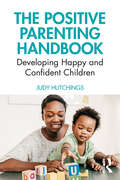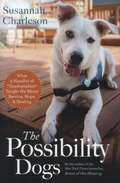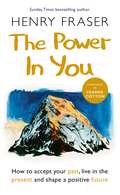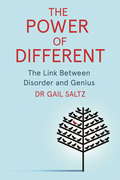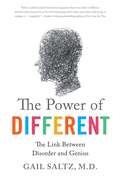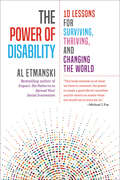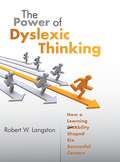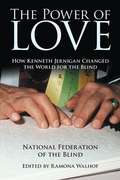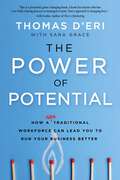- Table View
- List View
The Parents’ Practical Guide to Resilience for Preteens and Teenagers on the Autism Spectrum
by Jeanette Purkis Emma GoodallThis book empowers parents of autistic young people aged 11 to 20 to help them promote resilience in their child. Full of suggestions and simple activities, this easy-to-use resource will help guide parents on how to build the foundations of resilience and independence for situations such as negotiating sexuality and relationships, entering employment or living away from home. It includes information about the main developmental stages for preteens and teens on the autism spectrum, and will take parents through life events and milestones at different ages and identify where difficulties and barriers to resilience may arise and how to address them.
The Parent’s Guide to Oppositional Defiant Disorder: Your Questions Answered
by Amelia BowlerThis parenting guide to ODD offers expert information on your child's condition, provides insight and empathy to what they are going through, and equips and empowers you to make practical changes in your parenting approaches. It provides an overview of tried-and-tested techniques from a mother of a child with ODD to support you in response to typical questions you may have:· "Why is my child acting this way?"· "What does this say about me?"· "Why doesn't my child respond to punishment or reward?" · "What am I supposed to do next?"Overall this book teaches you how to avoid common mistakes in responding to ODD, the crossover with similar diagnoses such as ADHD and how to distinguish the disorders, how to improve your own resilience and confidence to communicate effectively with your strong-willed child, and start rebuilding the relationship you have.
The Parent’s Guide to Understanding and Supporting Your Child with Literacy Difficulties
by Valerie MuterWhy do some children experience literacy difficulties?How can I identify if my child finds reading and spelling challenging?What is the best way to support them at home?As a parent, it can be difficult to identify how your child's literacy difficulties may present in a home setting and supporting the child with literacy difficulties doesn't end at the school gates!Child psychologist, Valerie Muter, goes beyond the classroom to offer a wealth of resources for parents to use at home to help engage their child in reading and writing. From giving you a guidance on how to communicate with teachers about your concerns and requesting screenings and assessments to giving you lots of tips and tricks that you can implement at home to support your child's growth, this is the ultimate guide to answer all of the questions you might have about literacy difficulties and more.
The Pedagogy of Pathologization: Dis/abled Girls of Color in the School-prison Nexus
by Subini Ancy AnnammaWINNER OF THE 2018 NATIONAL WOMEN'S STUDIES ASSOCIATION ALISON PIEPMEIER BOOK PRIZE Linking powerful first-person narratives with structural analysis, The Pedagogy of Pathologization explores the construction of criminal identities in schools via the intersections of race, disability, and gender. amid the prevalence of targeted mass incarceration. Focusing uniquely on the pathologization of female students of color, whose voices are frequently engulfed by labels of deviance and disability, a distinct and underrepresented experience of the school-to-prison pipeline is detailed through original qualitative methods rooted in authentic narratives. The book’s DisCrit framework, grounded in interdisciplinary research, draws on scholarship from critical race theory, disability studies, education, women’s and girl’s studies, legal studies, and more.
The Personalized Autism Nutrition Plan: Nourishing Hope for Kids with ASD, ADHD, Anxiety, and Neurodevelopmental Delays
by Julie S. MatthewsCreate the right diet to support your child with autism or other neurodevelopmental delays through this step-by-step guide to optimal nutrition for their unique needs.If your child with autism spectrum disorder struggles with common symptoms such as irritability, anxiety, stimming, or gastrointestinal upset, you are not alone—and you are not powerless to help. This groundbreaking book offers the first personalized approach to help improve these disruptive symptoms through your child&’s diet, supplying you with the information and resources you need to holistically help them thrive. Certified nutrition consultant Julie Matthews pairs more than 20 years of clinical experience with practical advice and an attainable and adaptable 12-step plan for effectively addressing the symptoms of autism spectrum disorder, ADHD, ADD, Tourette&’s syndrome, Down syndrome, learning delays, anxiety, aggression, and defiant disorders. Matthews illustrates the underlying biochemical factors that cause these symptoms, and explains how therapeutic diets and nutritional supplements can have profound benefits for your child&’s body and brain. This scientifically proven program includes: Common and impactful diets to implement Adjustable daily meal plan ideas for each diet Detailed lists of key foods and nutritional supplements 50 nourishing and picky eater–approved recipes Symptom questionnaires for determining the right diet Just as every child with autism spectrum disorder is unique, there is no one-size-fits-all diet recommendation. The Personalized Autism Nutrition Plan is tailored yet flexible, empowering you with tools to drastically improve your child&’s well-being and help them thrive—with food as medicine.
The Physically Disabled Dancer and the Affirmative Model of Disability (Routledge Advances in Theatre & Performance Studies)
by Lawrence ShapiroThis volume investigates the contributions and achievements of the physically disabled dancer while challenging and recognizing the inherent inequities in the field of integrated dance in the UK which currently places greater emphasis on the learning‑disabled performer. This is the first book ever written by a physically disabled dancer on the subject of physically disabled dancers. Inherent in this examination is the model of examining disability that is most closely associated with the disability arts movement which is the ‘affirmative model of disability’. This model is defined as an approach to disability in which the disabled person is neither an object of medical care nor a victim of social indifference but a self‑respecting, autonomous individual in which their disability is a positive and affirming aspect of their self‑identity. This book, based on interviews with physically disabled dancers, choreographers, academics and arts producers all in a UK context, combines a wide range of perspective of disability dance together with the intellectual rigour of disability studies to produce a new definition of the physically disabled dancer as an affirming, positive, indispensable practitioner of contemporary performance art. The volume pioneers perspectives of the physically disabled dancer prioritizing first‑person accounts from the performers themselves to produce an unprecedented contribution to the study of disability arts from a uniquely British perspective.This book will offer educators as well as arts and cultural professionals a critical resource for facilitating work by and in alliance with practitioners of integrated dance.
The Piano Pedal Problem (Bo Keeps the Beat)
by Andrew BambridgeBo really wants to take piano lessons like his older brother Jason. But there are two problems—his mom says he’s not ready, and his feet can’t reach the foot pedals because of his achondroplasia. But Bo knows that where there’s a problem, there’s a solution! With determination and the help of a kind teacher, Bo tackles the piano problem, and his feet and fingers finally feel the music! Musician, educator, and actor Andrew Bambridge (Pixels) offers a charming chapter book series about a boy named Bo who, like Andrew, has achondroplasia and has always loved music.
The Piper Model: Personalised Interventions Promoting Emotional Resilience in children with Social, Emotional and Mental Health Needs
by Dennis PiperThis book is intended to be both a practical evidence-based tool and an awareness-raising resource for teachers, teaching assistants, mentors and all adults who work with children and young people who present as 'extremely challenging' in the school context. In every school there are a small number of pupils, less than five percent, who take up more than fifty percent of the staff's time. This book provides school staff with an approach to personalised interventions that enable those children or young people to build life-long resilience skills.
The Pocket Diary of a SENCO: An Honest Guide to the Aspirations, Frustrations and Joys of Championing Inclusion in Schools
by Pippa McLeanThe Pocket Diary of a SENCO spans a typical school year and includes hopeful and often humorous diary entries that share the authentic aspirations, joys, and frustrations of championing inclusion and working in the role of a SENCO. Grounded in real-life experiences and day-to-day practice, Pippa McLean describes the experiences of a SENCO and the reality of SEND provision in school, drawing out the personal characteristics and values that schools can foster to support inclusive practice and nurture positive relationships between children, parents, and colleagues. Diary extracts across the months range from ‘Be ready to hit the road’, ‘Be gentle on yourself’, to ‘Be a culture builder' and ‘Be an advocate'. Each entry is followed by reflective questions and space for the reader to jot down their own thoughts, as well as ‘monthly musings’ to support their own professional development. Written in a truly conversational style, this essential pocket diary captures the reality of SEND provision in schools and will be relatable to many. It is valuable reading for SENCOs, teachers, support staff and trainees who wish to enrich their learning around inclusive practice and engage reflectively within their busy lives.
The Pocket Guide to Neurodiversity
by Daniel AherneA simple guide to neurodiversity, demystifying ADHD, autism, dyslexia, dyspraxia and more.At least one in seven people are thought to be neurodivergent. So what exactly is neurodiversity? What does 'executive functioning' mean? What are 'spiky profiles'?In this simple guide, expert speaker and trainer Daniel Aherne provides a clear introduction to neurodiversity and the four most common neurodivergent identities of autism, ADHD, dyslexia and dyspraxia. Using an analogy of a cactus needing a desert to grow in, he emphasises the importance of getting the environment right for neurodivergent people, rather than expecting them to adapt to the neurotypical world. Daniel, who himself has ADHD, also explains how neurodivergent people often have great strengths alongside areas of difficulty, and writes about the interplay between diagnoses, as well as unpacking tricky concepts such as working memory, sensory processing, communication differences and more.Busting common misconceptions and setting out simple tips and guidance for supporting the neurodivergent people around you, whether among your family, friends or at your school, college or workplace - or if you yourself are ND and want to improve the understanding of others - this essential guide will help us all celebrate neurodiversity and foster more inclusive communities.(P) 2023 Jessica Kingsley Publishers
The Pocket Guide to Neurodiversity
by Daniel AherneAt least one in seven people are thought to be neurodivergent. So what exactly is neurodiversity? What does 'executive functioning' mean? What are 'spiky profiles'?In this simple guide, expert speaker and trainer Daniel Aherne provides a clear introduction to neurodiversity and the four most common neurodivergent identities of autism, ADHD, dyslexia and dyspraxia. Using an analogy of a cactus needing a desert to grow in, he emphasises the importance of getting the environment right for neurodivergent people, rather than expecting them to adapt to the neurotypical world. Daniel, who himself has ADHD, also explains how neurodivergent people often have great strengths alongside areas of difficulty, and writes about the interplay between diagnoses, as well as unpacking tricky concepts such as working memory, sensory processing, communication differences and more.Busting common misconceptions and setting out simple tips and guidance for supporting the neurodivergent people around you, whether among your family, friends or at your school, college or workplace - or if you yourself are ND and want to improve the understanding of others - this essential guide will help us all celebrate neurodiversity and foster more inclusive communities. .
The Politics of Age and Disability in Contemporary Spanish Film: Plus Ultra Pluralism (Routledge Advances in Film Studies)
by Matthew J. MarrThe Politics of Age and Disability in Contemporary Spanish Film examines the onscreen construction of adolescent, elderly, and disabled subjects in Spanish cinema from 1992 to the present. Applying a dual lens of film analysis and theory drawn from the allied fields of youth, age, and disability studies, this study is set both within and against a conversation on cultural diversity—with respect to gender, sexual, and ethnic identity—which has driven not only much of the past decade’s most visible and fruitful scholarship on representation in Spanish film, but also the broader parameters of discourse on post-Transition Spain in the humanities. Presenting an engaging, and heretofore under-explored, interdisciplinary approach to images of multiculturalism in what has emerged as one of recent Spain’s most vibrant areas of cultural production, this book brings a fresh, while still complementary, critical sensibility to the field of contemporary Peninsular film studies through its detailed discussion of six contemporary films (by Salvador García Ruiz, Achero Mañas, Santiago Aguilar & Luis Guridi, Marcos Carnevale, Alejandro Amenábar, and Pedro Almodóvar) and supporting reference to the production of other prominent and emerging filmmakers.
The Politics of Autism: Navigating the Contested Spectrum
by John J. PitneyIn the first book devoted exclusively to the contentious politics of autism, noted political scientist and public policy expert John J. Pitney, Jr. , explains how autism has evolved into a heated political issue disputed by scientists, educators, social workers, and families. Nearly everything about autism is subject to debate and struggle, including its measurement and definition. Organizational attempts to deal with autism have resulted in not a single autism policy, but a vast array of policies at the federal, state, and local levels, which often leave people with autism and their families frustrated and confused. Americans with autism are citizens, friends, coworkers, sons, daughters, fathers, and mothers. No longer simply the objects of public policy, they are active participants in current policy debates. Pitney s fascinating look at how public policy is made and implemented offers networks of concerned parents, educators, and researchers a compass to navigate the current systems and hope for a path towards more regularized and effective policies for America s autism community. "
The Politics of Blindness: From Charity to Parity
by Graeme Mccreath<P>This book provides a rallying cry so that the voice of users of services can be heard, and both the provision of services can be tailored by and shaped to their needs. <P>The anti-discrimination clause, which I was proud to contribute to in the extension of the Disability Discrimination Act, the creation of the Disability Rights Commission (now part of the Equality and Human Flights Commission) and the Office of Disability inside UK government, has enabled individual and collective experience of inequality and discrimination to be tackled head on.
The Politics of Race, Class and Special Education: The selected works of Sally Tomlinson
by Sally TomlinsonIn the World Library of Educationalists series, international experts themselves compile career-long collections of what they judge to be their finest pieces – extracts from books, key articles, salient research findings, major theoretical and practical contributions – so the world can read them in a single manageable volume. Readers will be able to follow the themes and strands and see how their work contributes to the development of the field. Professor Sally Tomlinson brings together 12 of her key writings in one place, including chapters from her best-selling books and articles from leading journals. In this landmark publication she reviews and recounts the history and development of her research and writing over 30 years that is concerned with the politics of education systems, especially special education, and the place of social classes and ethnic and racial minorities in the systems. Social class, race and gender have historically always been essential markers in deciding who would receive a minimum or inferior education and thus fail to obtain whatever were currently acceptable qualifications. Definitions of the ‘less able’ or ineducable were based on beliefs in the biological and cultural inferiority of lower social classes, racial and immigrant groups. Professor Tomlinson’s aim in her work has always been to introduce sociological, historical and political perspectives into an area dominated by psychological, administrative and technical views and to explain how the individual ‘problems’ were connected to wider social structures and policies. This unique collection illustrates the development of Professor Tomlinson’s thinking over the course of her long and esteemed career.
The Positive Parenting Handbook: Developing happy and confident children
by Judy HutchingsDrawing on Judy Hutchings many years of work with parents and children, The Positive Parenting Handbook is a concise, straightforward guide that offers simple solutions to daily dilemmas. The clear and easy advice provides parents with skills and tools that support positive parent/child relationships for happy and confident children. It explains common behaviour problems in young children and offers expert advice on: -How to build strong bonds and let children know they are important to you -How to encourage behaviour we want to see through praise and small rewards -Giving instructions that children are more likely to follow -How ignoring some unwanted behaviours can be helpful -Strategies for managing difficult behaviour -Teaching new behaviour to our children -Developing children’s language. It includes six case studies of how these strategies have helped real families with everyday problems at bedtime and mealtimes, during toilet training, out shopping and when children experience anxiety. Together with suggestions of other useful books and information sources, The Positive Parenting Handbook is ideal for all parents, including those of children with diagnosed developmental difficulties, and the range of professionals who work with them.
The Possibility Dogs: What a Handful of Unadoptables Taught Me About Service, Hope, and Healing
by Susannah CharlesonThe Possibility Dogs: What a Handful of "Unadoptables" Taught Me about Service, Hope, and Healing is an "inspiring story that shows how dogs can be rescued, and can rescue in return. With her critically acclaimed, bestselling first book, Scent of the Missing, Susannah Charleson was widely praised for her unique insight into the kinship between humans and dogs, as revealed through her work in canine search and rescue alongside her partner, golden retriever Puzzle. Now, in The Possibility Dogs, Charleson journeys into the world of psychiatric service, where dogs aid humans with disabilities that may be unseen but are no less felt. This work had a profound effect on Charleson, perhaps because, for her, this journey began as a personal one: Charleson herself struggled with posttraumatic stress disorder for months after a particularly grisly search. Collaboration with her search dog partner made the surprising difference to her own healing. Inspired by that experience, Charleson learns to identify abandoned dogs with service potential, often plucking them from shelters at the last minute, and to train them for work beside hurting partners, to whom these second-chance dogs bring intelligence, comfort, and hope. Along the way she comes to see canine potential everywhere, often where she least expects it - from Merlin the chocolate lab puppy with the broken tail once cast away in a garbage bag, who now stabilizes his partner's panic attacks; to Ollie, the blind and deaf terrier, rescued moments before it was too late, who now soothes anxious children; to Jake Piper, the starving pit bull terrier mix with the wayward ears who is transformed into a working service dog and, who, for Charleson, goes from abandoned to irreplaceable."
The Power in You: How to Accept your Past, Live in the Present and Shape a Positive Future
by Henry FraserFrom Sunday Times bestselling author...'Henry Fraser is one of the most remarkable people I've ever met' J.K. Rowling'What a story of transformation, inner power and inspiration' Jonny Wilkinson Mouth artist, motivational speaker and author of the inspirational memoir The Little Big Things, Henry Fraser, explores the transformative power of acceptance in this motivational guide.If The Little Big Things was about Henry's past, The Power in You is about his present and his future. And through understanding his daily experience, Henry teaches us all how best we can live. This book is about right now, and it's about tomorrow.It's about recognising progress, it's about accepting our past to become free of it, it's about living in the now to avoid anxiety. It's future focused on the positive.Henry discusses acceptance, how to adapt and deal with our pasts, how to forgive ourselves, and how to forgive others. He will remind us to live in the present and just how empowering that can be, how to work through self-doubt, how to become aware of our progress, and how everything you need in life comes from within you.The power is in you.
The Power in You: How to Accept your Past, Live in the Present and Shape a Positive Future
by Henry FraserFrom Sunday Times bestselling author...'Henry Fraser is one of the most remarkable people I've ever met' J.K. Rowling'What a story of transformation, inner power and inspiration' Jonny Wilkinson Mouth artist, motivational speaker and author of the inspirational memoir The Little Big Things, Henry Fraser, explores the transformative power of acceptance in this motivational guide.If The Little Big Things was about Henry's past, The Power in You is about his present and his future. And through understanding his daily experience, Henry teaches us all how best we can live. This book is about right now, and it's about tomorrow.It's about recognising progress, it's about accepting our past to become free of it, it's about living in the now to avoid anxiety. It's future focused on the positive.Henry discusses acceptance, how to adapt and deal with our pasts, how to forgive ourselves, and how to forgive others. He will remind us to live in the present and just how empowering that can be, how to work through self-doubt, how to become aware of our progress, and how everything you need in life comes from within you.The power is in you.
The Power of Different: The Link Between Disorder and Genius
by Dr. Gail SaltzThe Power of Different is an illuminating and uplifting examination of the link between brain differences and aptitude. Psychologist and bestselling author Gail Saltz presents the latest scientific research and profiles famous geniuses and lay individuals who have been diagnosed with all manner of brain 'problems' - including learning disabilities, ADD, anxiety, depression, bipolar disorder, schizophrenia and autism. Saltz shows that the source of our struggles can be the origin of our greatest strengths. Rooted in her experience as a professor and practicing psychiatrist, and based on the latest neurological research, Saltz demonstrates how specific deficits in certain areas of the brain are directly associated with the potential for great talent. She also shows how the very conditions that can cause difficulty at school, in social situations, at home or at work, are bound to creative, disciplinary, artistic, empathetic and cognitive abilities.In this pioneering work, readers will find engaging scientific research and stories from historical geniuses and everyday individuals who have not only made the most of their conditions, but who have flourished because of them. Enlightening and inspiring, The Power of Different shows how the unique wiring of every brain can be a source of strength and productivity, and can contribute to the richness of our world.
The Power of Different: The Link Between Disorder and Genius
by Gail SaltzA powerful and inspiring examination of the connection between the potential for great talent and conditions commonly thought to be “disabilities,” revealing how the source of our struggles can be the origin of our greatest strengths. InThe Power of Different, psychiatrist and bestselling author Gail Saltz examines the latest scientific discoveries, profiles famous geniuses who have been diagnosed with all manner of brain “problems”--including learning disabilities, ADD, anxiety, Depression, Bipolar disorder, schizophrenia, and Autism--and tells the stories of lay individuals to demonstrate how specific deficits in certain areas of the brain are directly associated with the potential for great talent. Saltz shows how the very conditions that cause people to experience difficulty at school, in social situations, at home, or at work, are inextricably bound to creative, disciplinary, artistic, empathetic, and cognitive abilities. In this pioneering work, readers will find engaging scientific research and stories from historical geniuses and everyday individuals who have not only made the most of their conditions, but who have flourished because of them. They are leaning into their brain differences to: *Identify areas of interest and expertise *Develop work arounds *Create the environments that best foster their talents *Forge rewarding interpersonal relationships. Enlightening and inspiring,The Power of Different proves that the unique wiring of every brain can be a source of strength and productivity, and contributes to the richness of our world.
The Power of Disability: 10 Lessons for Surviving, Thriving, and Changing the World
by Al Etmanksi"This book reminds us of what we have in common: the power to create a good life for ourselves and for others, no matter what the world has in store for us." —Michael J. FoxThis book reveals that people with disabilities are the invisible force that has shaped history. They have been instrumental in the growth of freedom and birth of democracy. They have produced heavenly music and exquisite works of art. They have unveiled the scientific secrets of the universe. They are among our most popular comedians, poets, and storytellers. And at 1.2 billion, they are also the largest minority group in the world.Al Etmanski offers ten lessons we can all learn from people with disabilities, illustrated with short, funny, inspiring, and thought-provoking stories of one hundred individuals from twenty countries. Some are familiar, like Michael J. Fox, Greta Thunberg, Stephen Hawking, Helen Keller, Stevie Wonder, and Temple Grandin. Others deserve to be, like Evelyn Glennie, a virtuoso percussionist who is deaf—her mission is to teach the world to listen to improve communication and social cohesion. Or Aaron Philip, who has revolutionized the runway as the first disabled, trans woman of color to become a professional model. The time has come to recognize people with disabilities for who they really are: authoritative sources on creativity, love, sexuality, resistance, dealing with adversity, and living a good life.
The Power of Dyslexic Thinking: How a Learning (dis)Ability Shaped Six Successful Careers
by Robert W. Langston<p>Robert Langston shares the inspirational stories of people who overcame the hurdles of living with dyslexia to become influential business and cultural leaders. From Kinko's founder Paul Orfalea to prominent financier Charles Schwab to Pulitzer Prize-winning cartoonist Mike Peters, Langston profiles some of the biggest players in the business world and elsewhere to paint amazing portraits of courage and dedication. <p>Through both research and personal experience, Langston has come to believe that dyslexia is a condition that does not need curing, but rather a greater understanding of the different capabilities and skills it can provide those who have it. He hopes that understanding more about the creative and intuitive benefits of dyslexia will allow educators and parents, as well as dyslexic children, to see dyslexia not as a disability, but as a gift.</p>
The Power of Love: How Kenneth Jernigan Changed the World for the Blind
by National Federation of the Blind<P>The Power of Love: How Kenneth Jernigan Changed the World for the Blind shares the voices of a collection of individuals whose writings reveal the deep truth that serves as the foundation for the life and work of Kenneth Jernigan. <P>His life and their writings together speak of how Thomas Jefferson's self-evident truths imply that equality extends to embrace blind people just as surely as this country has come to understand equality's inclusion of all people regardless of the color of their skin. <P>Ramona Walhof, editor of The Power of Love and longtime friend of Kenneth Jernigan, draws together the distinctive voices of individuals who knew Kenneth Jernigan and whose lives he touched through his work with the National Federation of the Blind. Each of the reflections begins with a brief biographical sketch that introduces the chapter's author and ties his or her life to Kenneth Jernigan and his work. <P>The book concludes with a chapter, "Blindness: The Federation at Fifty," a retrospective written by Kenneth Jernigan himself in the last decade of his life. The Power of Love: How Kenneth Jernigan Changed the World for the Blind gathers a polyphonic chorus of voices that tell how the power of love, coursing through the life of Kenneth Jernigan, changed the world for the blind and, in so doing, changed the world for everyone.
The Power of Potential: How a Nontraditional Workforce Can Lead You to Run Your Business Better
by Tom D'Eri&“This is a powerful, game-changing book, a book for anyone who has ever built a hiring process or managed a team. Tom's approach is changing lives.&”-Seth Godin, Author of This is MarketingRising Tide Car Wash in Parkland, Florida, isn&’t average in any way. When Tom D&’Eri and his father John bought the location in 2013, it was struggling. Now it&’s one of the highest-volume washes in Florida. Its employee retention rate is five times that of its competitors. It has spun off into two additional locations that have been immediately successful, and the business is absurdly profitable. Over 500,000 cars a year drive away sparkling. Rising Tide has become a media darling, featured on The Today Show, NBC Nightly News, and in magazines including Entrepreneur, National Geographic, and Forbes.Why so much hoopla over a successful car wash? Roughly 80 percent of Rising Tide&’s workforce consists of people with autism. While part of the success comes from their mission, that doesn&’t explain the excellence that permeates every aspect of the business: service quality, customer experience, teamwork, management, and organizational design. Put any aspect of the D&’Eris&’ operation against other businesses, and you&’ll find they have the edge.The Power of Potential tells the inspiring, surprising reason why: The wash&’s excellence isn&’t in spite of their unusual workforce, but because of it. Thanks to their unconventional staff, the Rising Tide team was able to discover and correct common problems that typically fly under the radar in businesses. By spotting and correcting these hidden problems, any business, with any kind of workers, can achieve unexpected wins and leave average behind. The common problems include:You Hire Based on InterviewsYou Think Great Talent Is the Secret to a Great BusinessYour Managers Are &“Good Enough&”You Fire Your Worst EmployeesTo our surprise, solving the four problems changed who we were as a company. The result was four unexpected wins that added up to a culture of excellence—but leadership is needed to reinforce what matters.Every Employee Feels SafeAccountability is a Tool for GrowthYour Work Has PurposeCustomers Love Their Experience
